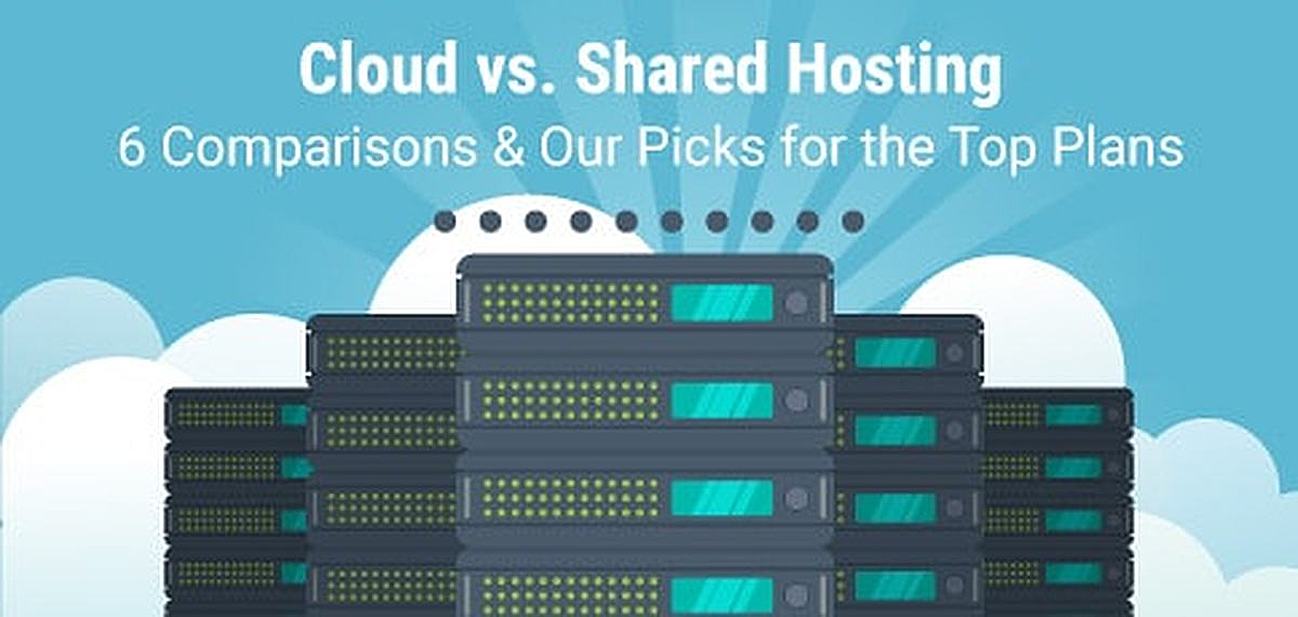What is Cloud Web Hosting And How Does It Work? – Cloud web hosting is a type of hosting service that uses multiple servers to host websites or applications. It provides users with increased availability and scalability as compared to traditional hosting services, which use one server. This is because cloud hosting can spread the load across many different servers instead of relying on just one.
Each server in the cloud performs specific tasks depending on its configuration, such as handling requests for pages from visitors, providing databases or running email accounts. The primary benefit of this setup is that it allows for greater flexibility when it comes to managing traffic spikes since resources are dynamically allocated based on demand. Additionally, if one server goes down due to a technical issue then another will be available without any downtime experienced by customers visiting your site or using your application.
Cloud web hosting is a type of internet hosting service that utilizes multiple servers for storing and managing data. It allows users to store their website files on remote servers located in the cloud, making it easier to access from anywhere in the world with an internet connection. Cloud web hosting also provides users with more flexibility than traditional shared or dedicated server plans since resources can be easily scaled up or down depending on your needs.
Additionally, cloud hosting offers greater reliability as websites are hosted across multiple connected servers rather than a single physical one. Overall, cloud web hosting is an efficient and cost-effective solution for businesses looking to maximize their online presence without breaking the bank.
What’s the difference between a server and a cloud hosting?
What is the Difference between Web Hosting And Cloud Hosting?
Web hosting and cloud hosting are two different types of web hosting services, each with its own advantages and disadvantages. Web hosting is the traditional form of website hosting, where your site is hosted on a single server or a network of servers. This type of service provides you with greater control over the setup, as well as better performance due to dedicated resources for your website.
However, it can be more expensive than cloud-hosting due to the cost associated with maintaining physical hardware. Cloud hosting is an alternative option that allows users to access their websites from multiple virtual servers in a shared environment. With this type of service, you don’t need to worry about purchasing additional hardware or paying maintenance fees since the infrastructure is managed by a third party provider who takes care of all aspects related to running the data center.
Additionally, cloud-hosting offers scalability benefits since you can easily increase or decrease capacity depending on your business needs without having to purchase additional hardware or software licenses.
When Should You Use Cloud Hosting?
Cloud hosting is an ideal choice for businesses that require more computing power and storage than what’s available on their local servers. Cloud hosting provides a great alternative to traditional server-based hosting by offering the ability to scale up or down depending on the needs of the business. With cloud hosting, businesses can access resources from anywhere in the world without having to invest in new hardware or software licenses.
Additionally, cloud-hosting offers a cost effective solution when compared to other traditional methods as users only pay for what they use. Also, with cloud-hosting providers such as Amazon Web Services (AWS), Microsoft Azure and Google Cloud Platform (GCP) providing reliable services with built-in security measures, there is no need for IT teams to worry about managing physical infrastructure or maintaining additional staff members responsible for system maintenance and upgrades. Therefore, if your business requires high performance computing capabilities, enhanced scalability and flexibility or has limited capital resources then you should strongly consider using cloud hosting solutions instead of traditional server options.
What is the Difference between Cloud Hosting And Cloud Server?
Cloud hosting and cloud server are often used interchangeably in the IT industry but there is a difference between them. Cloud hosting refers to an overall service of providing hosted services over the internet, while cloud server is actually one type of cloud hosting that provides dedicated resources for web applications and websites.
When it comes to cost-efficiency, both types of cloud technology offer significant savings compared to traditional on-premise servers.
The biggest difference lies in their configuration; with a cloud host, you pay only for what you use (in terms of storage space, bandwidth etc.), while with a cloud server you get more control over how resources are allocated. This means that when choosing between the two options, businesses must consider their needs carefully before making a decision as each option has its own benefits and drawbacks depending on requirements.
In terms of scalability, again there are differences – whereas most shared hosts can be scaled up quickly at an additional cost by adding more RAM or disk space if needed, this isn’t always possible with a dedicated server since hardware upgrades require time to install and configure properly.
On the other hand though, having your own physical machine also offers greater flexibility when it comes to customizing settings or running specialized software unlike virtualized environments where such tasks may not be allowed due to security reasons.
How Do I Set Up Cloud Hosting?
Cloud hosting is a great way to host websites and applications. It offers scalability, reliability, and cost savings compared to traditional on-premise hosting solutions. Setting up cloud hosting can be easy or complex depending on your needs.
To get started, you’ll need to determine which type of cloud infrastructure will best meet your requirements: public clouds (such as Amazon Web Services), private clouds (hosted by a single provider) or hybrid clouds that combine both options. Once you’ve chosen the right option for your business, you can begin setting up the environment. This includes selecting the operating system, choosing compatible software and hardware components such as servers and storage devices, configuring networks and firewalls for secure access from outside locations, assigning IP addresses for each server instance in the cloud infrastructure, creating user accounts with appropriate permissions levels for accessing resources within the cloud environment ,and finally deploying applications onto these servers so they’re ready to use.
Finally once everything has been set up properly it’s time to test out all of your settings before launching into production mode – this ensures everything runs smoothly when users start connecting remotely over the internet!
Why is Cloud Hosting Better Than Web Hosting?
Cloud hosting is one of the most reliable, secure, and cost-effective ways to host a website. It offers many advantages over traditional web hosting solutions such as dedicated servers and shared hosting plans. The main benefit of cloud hosting is scalability.
With cloud hosting you can easily scale up or down depending on your needs without any additional costs or hassles. You don’t need to purchase new hardware or upgrade existing software – instead, you just pay for what you use when you need it. Cloud hosted websites also offer better performance since resources are distributed across multiple servers in different locations, which helps minimize downtime and improve user experience by minimizing loading times.
Additionally, because data is stored offsite in highly secured data centers with 24/7 monitoring and support staff available round the clock should any issues arise, your site will be more secure than ever before – meaning less risk of experiencing cyberattacks or other malicious activities that could compromise sensitive customer information and put your business at risk. All these benefits make cloud hosting an ideal choice for businesses looking to maximize their online presence while cutting costs in the long run – making it a much better option than traditional web hosting solutions like shared plans and dedicated servers.
Can I Host My Own Website in Cloud?
Yes, you can host your own website in the cloud. Cloud hosting is a great way to get your website up and running quickly with minimal effort and cost. The cloud offers scalability so that your site can grow as needed without needing to invest in additional hardware or software resources.
You can also benefit from improved reliability since the cloud provider is responsible for maintaining the servers, while you are free to focus on developing your website. Additionally, most cloud providers offer automated backups of data so that if anything goes wrong, you don’t have to worry about losing any important files or information. Finally, many cloud hosting services offer access control features which allow you to customize who has access to certain areas of the site or even limit what they can do when they log in.
All these benefits make it easy to see why more people are choosing cloud hosting for their websites!

Credit: www.cloudoye.com
What is Cloud Hosting How Does It Work
Cloud hosting is a type of web hosting that uses remote servers, known as the cloud, to store and manage data. Instead of relying on a single physical server, your website can access resources from multiple remote servers located in different parts of the world. This allows for greater scalability and reliability since it doesn’t rely on any one server or location.
Additionally, cloud hosting can provide improved security since there are no single points of failure and the network is distributed across many machines.
Advantages of Cloud Hosting
Cloud hosting provides a number of advantages over traditional web hosting. One of the main benefits is scalability, which allows businesses to increase or decrease their computing resources at any time without having to purchase additional hardware. Additionally, cloud hosting reduces costs significantly by eliminating the need for physical server infrastructure and providing access to high-performance computing power on demand.
Cloud hosting also offers increased reliability due to its distributed nature – if one server goes offline, another can take over within seconds. Finally, managing cloud servers is much easier than managing physical ones since it’s all done through an intuitive online interface.
Cloud Hosting Vs Web Hosting
Cloud hosting is a type of web hosting that relies on multiple servers connected to form a cloud. It offers more flexibility and scalability than traditional web hosting, allowing websites to quickly adapt to changing traffic demands without the need for manual intervention or additional hardware. Cloud hosting has become increasingly popular due to its cost-effectiveness, reliability, and ability to provide high levels of performance.
On the other hand, web hosting involves one server with limited resources dedicated solely for your website. While it can offer reliable performance in some cases, it may not be able to meet higher traffic demands or handle sudden spikes in activity as effectively as cloud hosting can.
Best Cloud Hosting
Cloud hosting is an increasingly popular option for businesses looking to store and manage their data. With cloud hosting, you can access your files from anywhere in the world with an internet connection, as opposed to having them stored on a physical server in one location. Additionally, cloud hosting offers scalability so that you can increase or decrease storage space depending on your needs.
Cloud servers are also more secure than traditional servers because they come with built-in redundancy and backups which allow for quick recovery if something goes wrong. Finally, many providers offer cost savings compared to traditional server solutions due to lower hardware and maintenance costs associated with cloud computing. All of these factors make cloud hosting an attractive solution for business owners who need reliable and secure data storage options at competitive prices.
Google Cloud Web Hosting
Google Cloud Web Hosting is a cloud-based hosting service that provides users with the ability to host websites, web applications, and other services on Google’s secure global network. This service allows businesses of all sizes to take advantage of Google’s reliable infrastructure and scalability while maintaining control over their data. With its pay-as-you-go pricing model, businesses can tailor their usage according to the size of their business and budget.
Additionally, customers benefit from having access to a wide range of features such as built-in security measures and tools for managing databases efficiently.
When You Run a Website on the Cloud, the Website is Restricted to One Physical Server.
When you run a website on the cloud, it is not restricted to one physical server. Instead, your website will be hosted across multiple servers that are connected over the internet, allowing for more reliability and scalability than running the site off of a single machine. This makes sure that if one server goes down or becomes overloaded with requests, there are other machines available to handle additional requests and keep your site running smoothly.
Cloud Hosting Pricing
Cloud hosting pricing is based on a variety of factors, such as the amount of memory and storage space needed for your website, the number of websites hosted on the cloud server, and other features like backups. Generally speaking, cloud hosting plans can range anywhere from $5 to $500 per month depending on these factors. Additionally, many cloud providers offer discounts if you sign up for longer terms or pay in advance.
It’s important to research different providers before making a decision in order to find the best plan that fits your budget and needs.
Cloud Server Hosting Free
Cloud server hosting free is a great way to get started with cloud computing. It allows businesses and individuals to use the power of servers without having to invest in hardware or software, providing an economical alternative for those who don’t need high-end performance. Cloud server hosting free offers both public and private cloud options that can be used for web applications, databases, file storage, or other needs.
With increased flexibility and scalability at no additional cost, cloud server hosting free provides a great platform for getting your business off the ground.
Conclusion
Cloud web hosting is a great option for anyone looking for reliable, cost-effective and secure hosting. It offers many advantages over traditional server-based hosting options, including scalability, flexibility and reliability. Plus, the cloud environment makes it easier than ever to quickly deploy applications and websites with minimal downtime.
With its many benefits, cloud web hosting is an attractive choice for businesses of all sizes that are looking to maximize their online presence.






